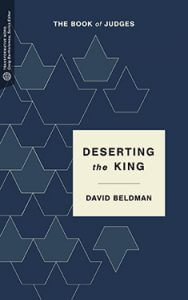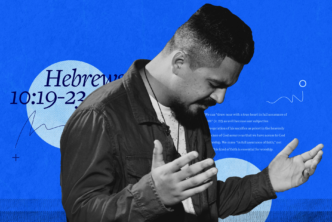The book of Judges is filled with memorable stories. While there are examples of faithful believers scattered throughout its pages, many of these stories are filled with political intrigue and bloodshed. Perhaps the most difficult issue is to discern how these stories are relevant for today. On the surface, it may seem like Judges is just a collection of cautionary tales from the ancient world but what if the book provides a blueprint for modern cultural engagement?

In Deserting the King, David Beldman argues that Judges is more than a study on the moral failings of an ancient people, it presents important theological implications for contemporary Christianity. Like the ancient Israelites, the modern church is called to engage with the rest of the world while ensuring that God’s purposes for the world are worked out in every dimension of our lives. How can we remain faithful to God in today’s secular society? How do we lead lives of public service without falling to contemporary idols? Beldman examines these issues through the lens of the tragedy and heroism in the book of Judges.
In the introduction to Deserting the King, Beldman explains how this perplexing book shows us how God is working in the world, today and in the past:
The basic message of Judges is a divine summons for God’s people to remember who they are and what King Yahweh has done for them. On that basis, they are to live out their calling as Yahweh’s representatives on earth for the blessing of the nations. This message resounds through the centuries, and it continues to summon followers of Jesus like you and me to live out our calling amidst the challenges of the 21st century.
Although the book of Judges contains some of the most memorable stories of the Bible—stories of bloodshed, intrigue, and heroism—it also presents readers with perplexing riddles that seem impossible to solve. Its complex and sometimes bizarre situations, characters, and behavior may at points cause us to wonder how this book could possibly prompt us to say, “This is the Word of the Lord; thanks be to God.” Perhaps the most fundamental puzzle facing modern readers of Judges is: How do we attune our ears so that we might hear God speaking to us today through the book of Judges? While there are some puzzles in the book that we may never solve, Judges does provide us with unmistakable clues for understanding this perplexing—yet vital—part of the Bible.
Think of Deserting the King as a map to help you gain your bearings in the book of Judges. Maps are most helpful in places that are unfamiliar to us, but they can also help us find new areas to explore in familiar places. Most important, a map should never be an end in itself. It should always drive us back to the places it represents—to explore the riches of the terrain itself. I hope that, like a good map, Deserting the King helps you make your way through the sometimes-disorienting terrain of Judges and prompts you to return again and again to the biblical text itself.
Deserting the King is an engaging, accessible thematic exploration of Judges—and the next volume in the Transformative Word series. Order today!




